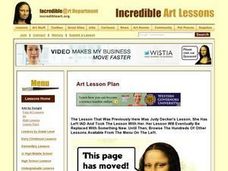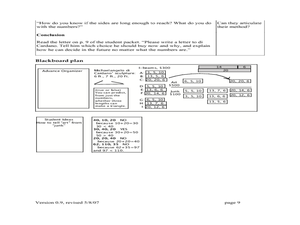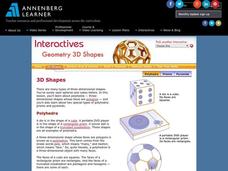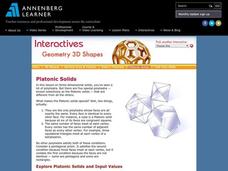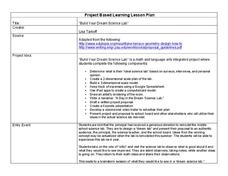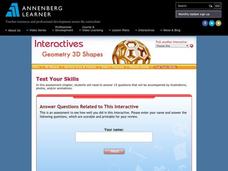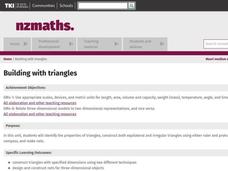Curated OER
Eye-Popping Op Art
Students examine and discuss work of Hungarian artist Victor Vasarely, recognize visual components of Op Art, compare traditional Renaissance perspective with Op Art's illusion of three-dimensional space, and create original painting...
Curated OER
Two-Dimensional Drawings from Three Dimensional Objects
Sixth graders identify and replicate two dimensional illustrations of three dimensional objects. In this spatial visualization lesson, 6th graders practice viewing objects from various sides. Student participate in stations to view...
Curated OER
Shapes
Fifth graders explore shapes. They recognize and name two-dimensional and three-dimensional shapes. Pupils discuss the properties and criteria for each shape they find in real life and construct a Kid Pix project using pictures of the...
Curated OER
Explore Three-Dimensional Shapes
Students are assigned to shape groups and explore three-dimensional shapes. They review math skills and two-dimensional shapes.
Curated OER
Paper Maché Mancala Game Boards
Seventh graders create three dimensional works of art from two dimensional plans, develop skills in papier-mach?? technique, utilize elements and principles of design to create 3-D form, and develop math/strategy skills in playing the...
Denton Independent School District
Build a Geome-Tree
Geometers construct a mobile or ornament using nets of three-dimensional polyhedrons. Not only do they need to compute the volume and surface area of each figure, they also earn points for creativity, neatness, and more!
Illustrative Mathematics
Christo’s Building
Hook your charges on how to solve a real-world art problem with mathematics by showing works of Christo. You can find eye-catching images on the Christo and Jeanne Claude webpage. Here, math learners help Jean Claude and Christo prepare...
Curated OER
Art or Junk? Discovering the Triangle Inequality
Middle schoolers study the triangle inequality. They will identify, compare, and analyze attributes of two and three-dimensional shapes. Then they develop vocabulary to describe the attributes. They also use manipulatives to analyze the...
Annenberg Foundation
Geometry 3D Shapes: 3D Shapes
Explore vocabulary related to three-dimensional shapes. An instructional website describes the characteristics of different geometric solids. Learners can use an interactive component to view nets, faces, vertices, and edges of common...
Annenberg Foundation
Geometry 3D Shapes: Platonic Solids
From polyhedrons to platonic solids, here is a lesson that will have your classes talking! As an introduction to platonic solids, scholars cut and fold nets to create the three-dimensional solids. They use an interactive component to...
Annenberg Foundation
Geometry 3D Shapes: Euler's Theorem
How do you get a theorem named after you? Euler knows what it takes! The third lesson of five asks pupils to use an interactive activity to compare the faces, vertices, and edges of seven different three-dimensional solids. They use...
Curated OER
Finding Polygons in Cubist Art
Fourth graders explore geometric properties and relationships in a two-dimensional work of art. They first search for and identify polygons in a Cubist painting and then use polygons to create their own Cubist portrait of a classmate.
EngageNY
End-of-Module Assessment Task: Grade 8 Mathematics (Module 7)
It's time to discover what your classes have learned! The final lesson in the 25-part module is an assessment that covers the Pythagorean Theorem. Application of the theorem includes distance between points, the volume of...
Curated OER
Build Your Dream Science Lab
Would your ideal science lab be filled with bubbling beakers and zapping Tesla coils? Or would it contain state-of-the-art computer technology and data analysis? Dream big with an innovative lesson that connects math and language...
Curated OER
Circle Art
Students investigate two and three dimensional shapes. In this geometry lesson, students write equations of circles and graph them correctly. They create pictures using circles.
Annenberg Foundation
Geometry 3D Shapes: Surface Area and Volume
Whether you wrap it or fill it, you're using geometric concepts. Classmates use an interactive approach to learn how to find volume and surface area of cylinders and prisms in the second lesson in a five-part series. The online lesson...
Annenberg Foundation
Geometry 3D Shapes: Test Your Skills
Time to find out what they've learned! The final lesson of a five-part series has learners complete a 39-question multiple choice review. They use what they've learned in the previous lessons to complete questions that include concepts...
Curated OER
Building With Triangles
Fourth graders use two different techniques to construct triangles with specific dimensions. They determine how to construct nets for three-dimensional objects focusing on those made with equilateral triangles. They are able to name the...
Curated OER
Designed to Scale
Seventh graders construct a three dimensional model of a constellation. In this constellation activity, 7th graders make a blueprint for a scale model of the constellation and create their models. They present their models to the class.
Learner
Solid Shapes
A collection of two lessons, kindergartners will identify two-dimensional shapes in solid shapes. They will develop basic knowledge of the components that make up a sphere, rectangular prism, pyramid, cylinder, cone, and cube. Young...
Curated OER
Sports Lesson Plan
Have your class participate in a variety of sports and craft activities using this resource. With sports as the theme, learners work on art projects. Students create soccer ball prints, a three dimensional football, and a sports collage.
Curated OER
Get in Shape with Geometry
Using geoboards, computer programs, and hands-on manipulative materials, elementary schoolers engage in a study of two and three-dimensional geometric shapes. This lesson is chock full of good teaching ideas on the subject, and the...
Curated OER
Shapes: Art or Geometry
Budding artists or mathematicians read about,and then draw, two very different shapes. Geometric and organic 2-D shapes are defined. Learners use the definitions to draw examples of each.
Curated OER
Artistic Angles
Fifth graders explore angles by using protractors. They recognize, describe and determine the surface area and volume of three-dimensional shapes. Students recognize the right angle, acute angle, obtuse angle and vertex. They identify...




